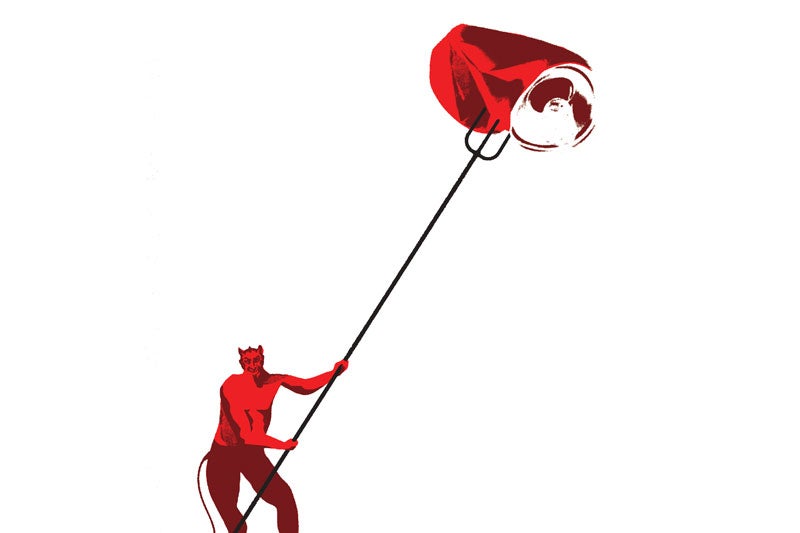Can We Tax Unhealthy Habits Away?
Boosting the cost of sodas and sugary drinks might not necessarily add up to better health, say USC experts.
Alexander Hamilton was one of the first to try convincing Americans to pay for their sins.
In 1790, the U.S. statesman proposed a tax on whiskey, an unapologetic move designed to help the upstart nation tackle Revolutionary War debt. Hamilton’s proposal not only spurred the Whiskey Rebellion but also introduced the concept of sin taxes into the American consciousness.
More than 230 years after Hamilton’s novel overture, sin taxes — levies on goods seen as harmful, like sugary drinks, cigarettes, plastic bags and alcohol — stir intense public debate.
Proponents argue that they address the societal costs that come from bad behaviors. The health care costs of diseases related to tobacco use serve as one prominent example. They also say it’s a win-win: Why not nudge consumer behavior toward healthful habits while also boosting funding for programs that benefit the public? Others call sin taxes nothing more than a legislative cash grab that can hobble businesses. Not only do the taxes infringe on individual rights, they argue, but they often prove to be regressive — meaning that they’re harder on the poor.
As policymakers and economists try to quantify the results of unhealthful human behavior in dollars, can hitting people in the pocketbook create better habits and a better world? Do sin taxes work? Here’s what USC experts have to say.
The Obesity Researcher
Over the last 25 years, Children’s Hospital Los Angeles’ Michael Goran has watched childhood obesity rates rise and the quality of children’s diets decline. Worried by what he saw, the researcher began investigating what happens when children eat a sugar-rich diet — a contributing factor in weight gain — while they’re growing.
He points to one noteworthy modifiable culprit in particular: added sugars. About 70% of processed foods and 80% of snack foods contain added sugar, says Goran, professor of pediatrics at the Keck School of Medicine of USC.
The single largest source of added sugar in the average American’s diet isn’t food, though. It’s soda and sugar-sweetened beverages, according to the National Cancer Institute. With more than 60% of young people downing one of these drinks daily, Goran understands why the beverages have emerged as a convenient target for taxes.
Still, he has mixed feelings on these taxes, which are now levied in U.S. cities like San Francisco, Philadelphia and Chicago.
“It’s concerned me all along that taxes are limited to sugary beverages, when there’s an increased prevalence of added sugars throughout the diet,” says Goran, the Dr. Robert C. and Veronica Atkins Chair in Childhood Obesity and Diabetes and co-director of the USC Diabetes and Obesity Research Institute.
He remains unconvinced that modest soda taxes will reduce consumption enough to improve human health. But the levies are a reasonable place to start, he says. He hopes that more comprehensive efforts — driven by public education about added sugars — take hold, especially for infant formulas and foods.
“Ninety percent of toddlers consume added sugars in any given day, so we have to attack this problem earlier in life,” he says.
In California, Goran has been involved in dialogue with state legislators and other public health leaders about the potential use of warning labels on products with high sugar content.

“Warning labels make a lot of sense,” he says. “What’s wrong with giving consumers information?”
The Health Care Economist
It would be easy to point to Americans’ decreased tobacco use, one of the most significant public health stories of the last generation, as an example of what soda taxes might accomplish. But Dana Goldman doesn’t buy the comparison. He holds the Leonard D. Schaeffer Director’s Chair of the USC Leonard D. Schaeffer Center for Health Policy and Economics.
First, Goldman says, stiff taxes on tobacco made it harder for many cash-strapped teens to try cigarettes enough to get hooked on them. But most Americans develop a taste for sugary drinks in childhood, before they have to pay for them.
Second, the dramatic drop in tobacco use coincided with other initiatives, including robust public education and warning labels. Taxes alone didn’t curb the habit, says Goldman, Distinguished Professor of Public Policy, Pharmacy and Economics at the USC School of Pharmacy and the USC Price School of Public Policy.
Finally, he cites a key difference that remains a fundamental issue for soda tax advocates: While the negative effects of tobacco stand clear and well established, consuming food (and calories) is a routine — and necessary — part of everyday life. Scientists know that the way some excess sugars are metabolized in the body contributes to an increased risk of chronic diseases such as type 2 diabetes, cardiovascular disease and fatty liver disease. However, they can’t say definitively that the calories from sugary drinks are more harmful than calories from other junk foods.
Goldman applauds several cities’ experiments to curb consumption of sugar-sweetened drinks, but he presses for more time and research to assess how these taxes impact long-term behavior. Two years after Philadelphia’s soda tax was introduced in 2017, researchers at Stanford and Northwestern universities and the University of Minnesota found that few Philadelphia consumers swapped soda for more-healthful (and untaxed) beverages such as water as a result. But many drove elsewhere to buy sugary drinks.
The results could shift as consumers adapt to the taxes over time — or not. It took years to see whether the campaign against tobacco worked, Goldman notes, and that will likely apply to soda taxes as well. “And if we impose a soda tax and people still drink soda, it runs the risk of becoming regressive over time,” he says. A higher price puts a bigger tax burden on people who earn less.
“A reasoned view of this requires more research on effective interventions that change behavior, including the taxes,” Goldman says. “With that, we can then have more confidence in the policy.”
The Public Finance Expert
Michael Thom once assumed that sin taxes curb unhealthful behavior. But his subsequent research has made him skeptical. The public finance and taxation expert — and author of the book Tax Politics and Policy and a forthcoming one on sin taxes — expresses concerns about the science supporting levies such as the ones on sweetened drinks. “Are we so sure soda is driving obesity?” he asks.
Beyond health concerns, the associate professor at USC Price also notes that sin taxes can be a counterproductive way to raise revenue. The money collected often is funneled back to support interest groups that lobby for these very taxes. There can also be unintended, costly consequences like spurring the rise of black markets for taxed goods.
Consider, too, the taxes and bans on single-use plastic shopping bags that have been enacted in many cities to reduce plastics in the environment. Stores began charging customers for paper bags in part to push customers to bring their own. But a reusable sack made from cotton — which requires significant water to grow — must be reused 131 times before it is better for the environment than a single-use bag, according to the U.K. Environment Agency.
Policymakers, Thom continues, tend to view sin taxes as a tool to raise revenue without cutting spending. Or they may use them as a way to skirt political fallout from increasing property taxes or sales taxes, which touch more people.
“It’s as if policymakers are saying, ‘Don’t drink, smoke or gamble, but we would appreciate if some of you do, because we need the money,’” he says. So what does the future hold? He foresees these taxes becoming more prevalent — especially if policymakers use them as a convenient compromise to stricter all-out bans on the products.



